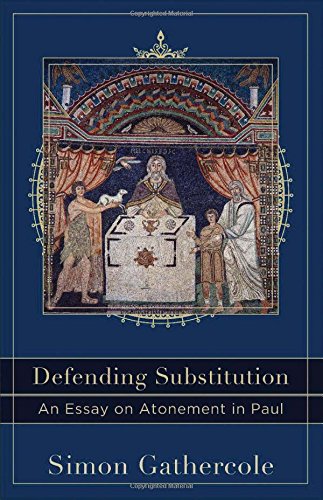Reviewed by Fred G. Zaspel
The doctrine of the substitutionary death of Jesus Christ has come under suspicion again in recent years, but this important new essay by the noted New Testament scholar Simon Gathercole will demand answer from those who would deny the church’s historic understanding. Much of contemporary scholarship has presented Christ’s death as a representative act in which believers participate. Gathercole applauds this emphasis but insists that Christ’s death is nonetheless substutionary – not either-or but both-and. Gathercole emphasizes that “the argument here does nothing to undermine the importance of representation and participation. Rather, the point is that substitution can happily coexist with them.”
Overview
Gathercole’s approach is simple and straight-forward: focusing primarily on two Pauline passages (1 Cor. 15:3-4 and Romans 5:6-8) he patiently demonstrates that the apostle’s language unavoidably reflects the idea of substitution – Christ’s dying in the place of his people because of their sins. Whatever notions of representation or identification may be present, substitution remains in view. His focus is narrowly on substitution – Christ died “instead of us, in our place” – as expressed in two Pauline passages.
In his 14-page introduction Gathercole carefully defines his subject, distinguishes it specifically from larger entailments, and surveys the major criticisms of substitution. Of all the various criticisms brought against substitution (logical, philosophical, theological) the most important is the exegetical – the claim that Scripture does not allow the doctrine. And so Gathercole devotes his first chapter to these “Exegetical Challenges” from “The Tubingen Understanding of Place-Taking” (Hartmut Gese, Otfried Hofius), “Interchange in Christ” (Morna Hooker), and “Apocalyptic Deliverance” (J. Lewis Martyn). Gathercole finds certain strengths among these understandings but emphasizes their respective weaknesses. Common to all these, he argues, is the failure to recognize the significance of sin – the factor that demands substitution.
Chapter two examines 1 Corinthians 15:3 – “Christ died for our sins according to the Scriptures.” Here Gathercole investigates the Old Testament language of “dying for sins,” a phrase that clearly connotes dying because of or as a consequence of sin. What is important about Paul’s statement is that Christ died for our sins. While this language is not the explicit “Christ died in our place / instead of us,” the meaning is necessarily the same. “Since ‘Christ died for our sins,’ it is no longer the case that we will die for them.” The consequence of our sins, death, was taken by Christ. Hence, substitution – X dies for the sins of Y. And this, Gathercole notes, is “primary” in Paul’s gospel proclamation – it is of “first” importance.
Chapter three examines Paul’s statement in Romans 5:6-8. Here the language is explicit: “Christ died for us.” But Paul’s discussion entails a stark contrast, and Gathercole gives extended attention to what might be found in classical literature that reflects Paul’s remark, “for a good person someone might perhaps even dare to die.” He finds several examples of persons dying in place of a loved one (i.e., substitution). These parallel Paul’s statement in Romans 5:6-8 but with this startling difference: “In the examples from classical literature, there is first the relationship, and this relationship provides the context that makes the vicarious death at least understandable,” while “Christ’s death creates a friendship where there had been enmity.” And so the idea of dying “for our sins” is not far away, but the language is explicitly that of substitution: “While we were enemies, Christ died for us.”
Reflections
It would be difficult to find a doctrine of more central importance to Christian faith and life. The apostle Paul himself says so – it is of “first” importance. It is a theme that resonates in every redeemed heart, and as such it is always a joyful moment to find it expounded with clarity. As one who holds passionately to the doctrine of Christ’s substitutionary death I find little to critique in Gathercole’s essay. We might wish he had taken the study further, but there were space restraints for this study as it was given in its original form, and Gathercole himself notes that criticism may come on this score. His purpose is to demonstrate that the doctrine of substitution finds explicit grounding in the apostle Paul (and therefore in Scripture). The two passages he examines to this end are well-chosen, his exegesis is precise, and his conclusions are so compelling that it will be interesting to see how opponents of substitution respond, if at all. Indeed, although this little book could be described as an extended exercise in the obvious, this is its chief value. Gathercole’s careful analysis not only demonstrates but also clarifies the biblical substance of the doctrine of Christ’s vicarious death with illuminating exegetical precision.
Defending Substitution is a text that will sharpen understanding of this vital doctrine. It is easily accessible for Christian readers generally, but it is a book pastors and teachers especially will read to great profit. When we preach that “Christ died for us! Christ died for our sins!” we desperately want to be clear. And for that clarity Gathercole has rendered a wonderful service to the church.
Fred G. Zaspel is Executive Editor here at Books At a Glance.
